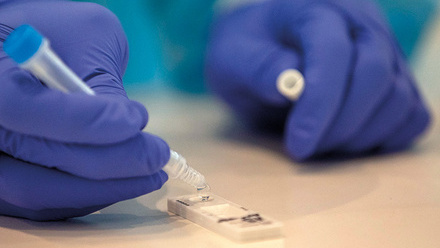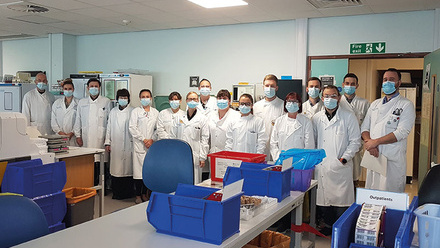My Lab: Tour of Point of Care Laboratory

The point-of-care testing (POCT) team at Addenbrooke’s Hospital (Cambridge University Hospitals NHS Foundation Trust) consists of 24 members of staff, consisting of biomedical scientists, associate practitioners, and administration staff, providing diagnostic testing outside of the conventional laboratory, the majority of
which is at the patient bedside.
We also have small POCT laboratories in both the emergency department (ED) and oncology to provide fast turnaround times on routine tests, to enable more efficient discharge, or aid quicker decisions on treatment, such as chemotherapy for oncology patients. These laboratories are staffed by our own team, rather than end-users, and the ED lab is a 24/7 service. We also provide ward-based POCT devices, such as glucose meters, INR meters and gas machines, among others, and provide support in the use of these through maintenance, provision and monitoring of EQA and continual training on devices to ensure competence of end-users. As a team, we are also often asked to evaluate new devices and the repertoire of POCT at Addenbrooke’s is expanding rapidly, as more wards are asking for advice on POCT as an alternative to laboratory testing.
My team is heavily involved in training of end-users, giving presentations at induction to each new intake of qualified staff, which can range from groups of 70 to 100, and training in smaller groups and one-to-one, where necessary.
As a department, we recently gained IBMS accreditation as a training laboratory for the certificate of competence, so that we could begin to take on trainee biomedical scientists and train them in POCT as a stand-alone “laboratory” service.
In the last year, we were able to take on our first trainee biomedical scientist, who successfully gained her certificate of competence in April. Working in the POCT department is very challenging and unpredictable, which can involve a lot of day-to-day problem solving. With the trust relying heavily on POCT, we provide an on-call out-of-hours service to ensure continuous provision of a high quality service.
We are also involved in evaluation projects of POCT devices. During the winter season, I have been involved in evaluating POCT PCR devices for flu in comparison to the central laboratory method, in order to provide a PCR analyser at the point-of-care for ED. This would mean that patients testing positive for flu can be isolated more quickly to help minimise the spread and outbreak of flu within the hospital. In the near future, we are also hoping to evaluate POCT devices for ammonia testing.
I am also hoping to be able to produce a POCT Specialist Portfolio that our biomedical scientists can complete as part of their CPD. In addition, we are working towards moving the majority, if not all, of our refresher training to e-learning packages to ensure efficiency and confidence in the continuous competence of end-users. The aim is also to work towards UKAS accreditation for the POCT service as a whole.
Michelle Lineham won a You Made a Difference Award in May. This recognises staff who have 'made a difference'
to patients, visitors or colleagues.



